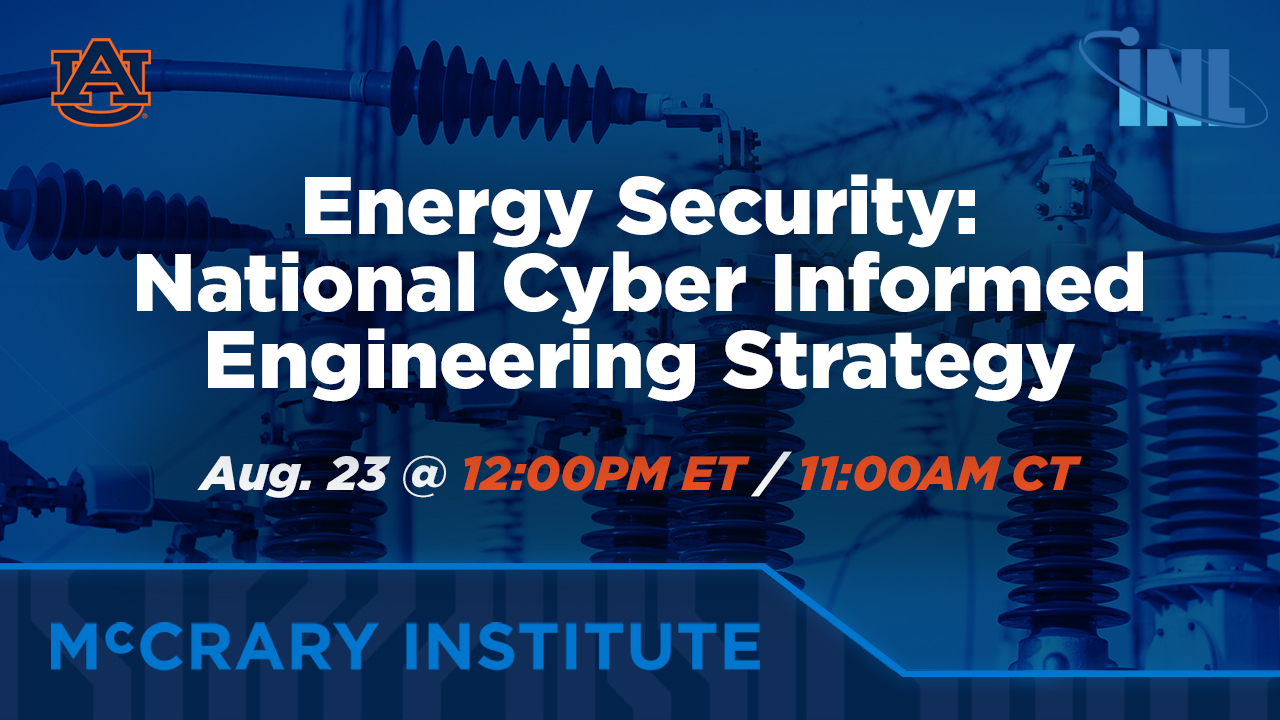Auburn to host national cybersecurity strategy roundtable Tuesday, Aug. 23
Published: Aug 18, 2022 8:04 AM
By Joe McAdory
Integrate cyber resilience into the design, implementation, operation and maintenance of critical energy infrastructure. That’s the National Cyber-Informed Engineering Strategy’s (CIE) mantra and theme of a special online discussion Tuesday, hosted by Auburn University and the McCrary Institute for Cyber and Critical Infrastructure Security.
The event will feature an all-star cast of government and energy sector administrators, including Joyce Corell, national cyber director for technology and ecosystem security; Stan Connally, executive vice president of the Southern Company; and Puesh Kumar, director of the Department of Energy’s Office of Cybersecurity, Energy Security and Emergency Response (CESER). Frank Cilluffo, McCrary Institute director, will moderate the two-hour program and is joined by Steve Taylor, interim dean of the Samuel Ginn College of Engineering.
“We need to start thinking cybersecurity on the front end of our products and systems,” said Cilluffo, “Obviously, when you think of the most critical systems, electricity and the grid are front and center. However, it has a much broader application across other critical infrastructure sectors.
“We want to ensure that product developers and designers are grasping this idea of concept to operation. This doesn’t apply only to the cyber security community, but it's the broader engineering community that has to incorporate cyber-informed engineering into their ways of doing business,” he added.
The McCrary Institute’s line-up on Tuesday spans that entire community – which includes leadership from Berkshire Hathaway Energy, TVA, MITRE, Schweitzer, and four National Laboratories.
Crafted by the Securing Energy Infrastructure Executive Task Force, of which four of Tuesday’s speakers are members, the National CIE Strategy was announced publicly by the Department of Energy (DOE) in June.
According to the DOE, “The National CIE Strategy offers a holistic approach to integrate cybersecurity considerations into the conception, design, build and operation of any physical system that has digital connectivity, monitoring or control.”
This strategy calls for using design decisions and engineering controls to mitigate avenues for cyberattacks or reduce the consequences when an attack occurs. The National CIE Strategy offers an integrated set of recommendations to incorporate CIE principles into engineering education and training, build a body of knowledge and resources for engineers, and apply CIE principles to the nation’s critical energy infrastructure and emerging technologies in a modern, decarbonized grid.
“Cybersecurity is everyone’s business and not just the discipline of cybersecurity experts,” Cilluffo, “Cybersecurity is often treated as a separate discipline, but it must be integrated into everyone’s DNA. We need to spread the word — and move ideas into action.”
Auburn University President Chris Roberts will make opening remarks, kicking off the 11 a.m. roundtable. Connally, Kumar and Zack Tudor, associate laboratory director of Idaho National Laboratory’s National and Homeland Security Directorate, will follow by making calls to action to industry sector leaders. The event will feature two main panels, “Making the Case” for CIE technology and “Pathways Forward” to discuss applying cybersecurity within infrastructure.
Charles McCrary, former president and CEO of the Alabama Power Company and namesake of the McCrary Institute, will offer closing remarks.
Media Contact: , jem0040@auburn.edu, 3348443447
The National Cyber-Informed Engineering Strategy was made public by the Department of Energy in June.


